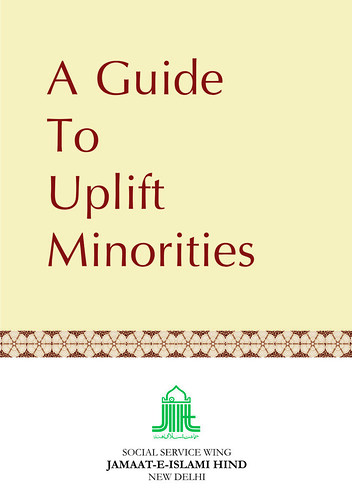By Mahtab Alam,
Name of the book: A Guide to Uplift Minorities
Compiled by: Abdur Rasheed Agwan and Edited by M. Gauhar Iqbal
Published by: Social Service Wing, Jamaat-e Islami, Hind
D-317, Dawat Nagar, Abul Fazl Enc, Jamia Nagar, New
Delhi-25
Pages: 319, revised edition- June 2010
Price: 150/- rupees
The empowerment of Muslim community in India has become a major issue of debate ever since the famous Sachar Committee submitted its report, within both the circles: Government as well as Community. The main reasons of backwardness of Muslim community in India are also two fold: first and foremost is government’s apathy towards the empowerment of the community and second, the lack of proper community initiatives itself.
Much can be said about the government’s apathy towards the upliftment of the Muslim community. However, it would not be unfair to say that even the community has failed to tap the resources available for its development. The reason can be attributed to lack of information about the schemes, organisational setup and trained human resource, etc.

In its fully revised edition, the book, A Guide to Uplift Minorities is a modest effort to fulfil that gap. As the very name suggests, it is a guide, aimed at providing information to the change-makers and other development professionals to enhance their skills and to work in a more focused, structured and systematic manner. The book is essentially divided into three major sections on establishing an NGO, its management and its funding. It starts with a gist of socio-economic and educational status of Muslims in India as the introduction.
Following the introduction are chapters detailed with information about how to make or register an NGO, how to run it and how monetary aids can be obtained for it. Besides, it contains information about NGO’s formation, minorities’ schemes, general schemes and the schemes which are offered by international agencies. One of the chapters of this book has the details about a range of schemes of the government granted for minorities and some other general schemes which minorities can avail benefits of. A list of national and international funding agencies and the priorities they have while sanctioning funds is also included, which makes it a complete guide in itself.
As the chapters of this book comprehensively cover various aspects required for the upliftment of Minorities from Formation of an NGO, Management of an NGO, Capacity building of its staff members, General Norms of Government Schemes to Exclusive Schemes for Minorities, it is able to fulfil one of its prime ideas of making the populace aware of the targeted beneficiaries of the various schemes and grants issued by the government. Information about Muslim funding agencies likes of Islamic Development Bank (IDB) and Muslim Aid, etc along with the procedure of obtaining grant or aid have also been explained in detail.
This book can be used not only as a guide but also a reference material and is a must for libraries, social activists and community leaders as well as heads of Muslim institutions. Grass-root activists can hardly afford to miss it, especially those who are working for the empowerment of minorities in general and the Muslims in particular. In a nutshell, it is an essential guide for empowerment of the Community.
(Reviewer is a Civil Rights Activist and freelance Journalist. He can be reached at [email protected])

